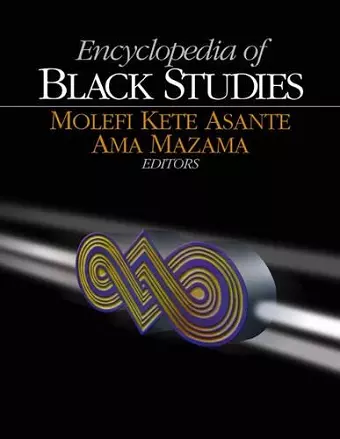Encyclopedia of Black Studies
Molefi Kete Asante editor Mambo Ama Mazama editor
Format:Hardback
Publisher:SAGE Publications Inc
Published:4th Jan '05
Currently unavailable, and unfortunately no date known when it will be back

Click ′Additional Materials′ for downloadable samples
The Encyclopedia of Black Studies is the leading reference source for dynamic and innovative research on the Black experience. The concept for the encyclopedia was developed from the successful Journal of Black Studies (SAGE) and contains a full analysis of the economic, political, sociological, historical, literary, and philosophical issues related to Americans of African descent. This single-volume reference is the vanguard of the recent explosive growth in quality scholarship in the field.
More than a chronicle of black culture or black people, this encyclopedia deals with the emergence and maturity of an intellectual field over the past four decades. Beginning with the protests at San Francisco State College in 1967 that led to the first degree-granting department of Black Studies, the field′s rapid growth over time necessitates an authoritative account of the discipline. More than ever scholars and students need a clear conception of what the evolutionary processes have been in the creation and maintenance of the discipline.
Chronology of Important Events in Black Studies
1966 Merritt College Black Studies Courses
1967 San Francisco State University Protests
1968 San Francisco State University Black Studies Program Established
1969 Cornell University students seize student center to protest harassment of African American Students
1970 University of California, Los Angeles opens Center for Afro American Studies
1969 Robert Singleton and Molefi Asante creates Journal of Black Studies
1972 National Black Political Convention of Gary, Indiana
1974 National Council of Black Studies founded
1982 Maulana Karenga′s Introduction to Black Studies published
1983 Mae Jemison who received majored in Black Studies and engineering is made the first African American female astronaut.
1986 Cheikh Anta Diop makes his transition
1988 Temple University approves doctoral program in African American Studies created by Molefi Kete Asante
1988 Toni Morrison wins Pulitzer Prize for Beloved
1990 Adeniyi Coker receives first Ph.D. in African American Studies
1992 Harvard University seeks "Dream Team" in African American Studies
1995 More than a million black men march in Washington, DC
1997 Phile Chionesu and Barbara Smith bring one million women to Philadelphia
Key Features
- More than 240 signed articles by nearly 200 scholars, organized A to Z, with coverage spanning the social sciences
- Edited by the founder and current editor of the Journal of...
"The book has an explanatory preface and excellent introduction that summarizes black studies for those unfamiliar with the field. Most of the articles provide a short bibliography of further reading for those seeking more in-depth knowledge. ...This is a required text for large public libraries and all academic libraries. It provides a thorough understanding of and easy reference into a growing, dynamic field of study." -- Stephen Stratton * BOOKLIST *
"Asante and the group originally centered at Temple University are credited with formalizing the discipline of Black Studies in the United States and make up most of the authors of this volume." -- Anthony J. Adam * Multicultural Review *
"Black studies has long needed this work to deflect and answer questions from critics and supporters. The editors set out to establish a baseline for understanding the field, to try in a work admittedly in progress to define the most commonly used ideas and concepts. . . . This work can be particularly helpful to scholars in tangentially related fields, helping them to know how black studies specialists define certain terms and concepts." -- C. Williams * CHOICE *
Asante offers students and educators an alternative perspective to the Eurocentric approach of the traditional college curriculum. Instead of interpreting social, political, historical and religious phenomena through the lenses of Western eyes, Afrocentricity seeks to identify the African place in such events. Emphasizing symbols, motifs, rituals and signs, this theory celebrates African cultural elements in all areas of life. . . . this formulation of the central ideas of an important group of scholars will be a valuable addition to many academic collections. -- John R.M. Lawrence, Reference Librarian
ISBN: 9780761927624
Dimensions: unknown
Weight: 1790g
568 pages